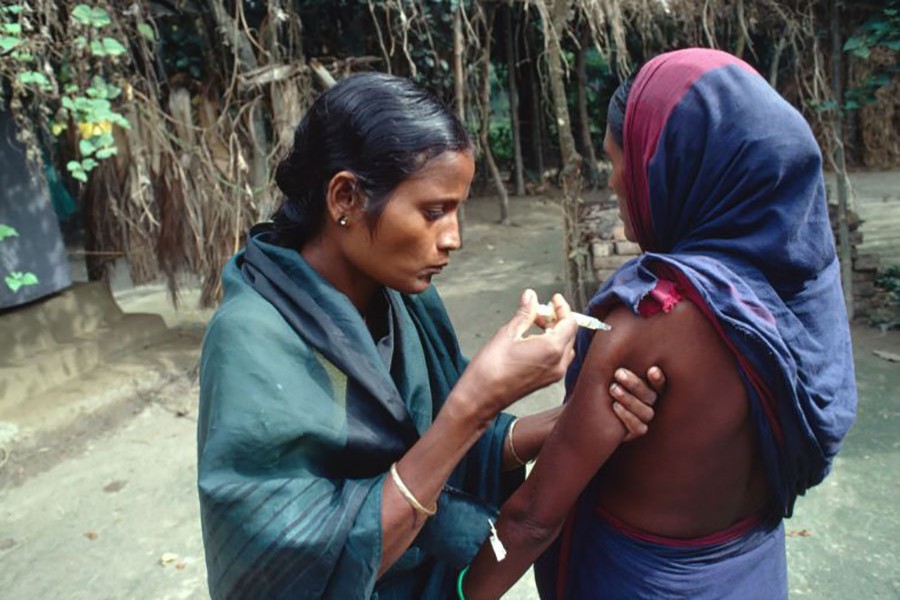
Published :
Updated :

Some 27,244 fertile people including 21,702 women have adopted permanent birth control method in eight districts under Rajshahi division during last one and half years till December last.
According to the official sources concerned, 45,042 women used intra uterine device (IUD) and 1,01,163 other women received implants as long-term birth control method during the same period.
Shafiqul Islam, divisional director of Department of Family Planning, here said there are also achievements in providing services of temporary contraceptives.
He said 5,27,654 injections and 13,33,989 oral pills were given to the targeted women side by side with distributing 1,81,197 condoms among the enlisted males.
Ferdousi Begum, 30, wife of a van-puller Aktar Hossain, said they have been living in Chowbaria under Paba upazila over the last 12 years. “We expected a male child very much and have four daughters and one son,” she said.
Ferdousi said now she understands what a fault it was for them to have more than one child as they fail to provide them with necessary food and medical services.
Population in the slum areas is decreasing day by day due to diversified interventions and available of family planning and adequate reproductive services.
Shafiqul Islam said the population and reproductive growth rates have been decreased to 1.25 per cent and 2.1 per cent respectively by dint of field level uninterrupted supply of contraceptive items during last ten years in the division.
In 2009, the increasing rate of population and reproduction was 1.39 per cent and 2.2 per cent respectively in the division.
Rate of contraceptive users has been increased to 71.6 per cent at present from 67.4 per cent in 2009 as contraceptive materials and 22 category medicines are being supplied free of cost from all the service centres.
“We have also achieved success in reducing the rate of maternal and child mortality,” he said categorically adding that maternal and child mortality rate has been decreased to 1.7 per cent at present from 3.2 and 4.8 per cent respectively among 1,000 live birth in 2009.
Eight new 10-bed mother and baby welfare centres (MBWC) were constructed for providing emergency postnatal cares, reports BSS.
A total of 395 including two new union health and family welfare centres (UHFWC) are encouraging the grassroots people to get services.
Some 310 UHFWCs are providing normal delivery services round the clock contributing a lot towards reducing maternal mortality. ‘Mayer Bank’ has been launched to encourage institutional delivery.
Emergency service package for newborns is being introduced at all service centres in phases. Adolescents-friendly health corner has been launched in two MBWCs and 20 UHFWCs.
Emergency obstetrics care services are continuing in eight district level MBWCs.
Upazila level people are getting maternal and child healthcare and family planning services from 12 MBWCs. A model family planning clinic has been set up at Rajshahi Medical College Hospital providing services to the target people regularly.
The DFP has brought more than 712 fertile couples residing in slum areas of Rajshahi City Corporation under its services.
There are around 910 fertile couples in 11 slum areas and necessary motivational and counselling activities are being promoted to bring the rest under the planned family campaign.
Success of building planned family in slum and underprivileged areas of the metropolis has started becoming visible by dint of need-based and diversified motivational activities.
Side by side with the government agencies, many non-government organisations have come together for building calculated families everywhere in the metropolis through substantial and sustainable promotion of reproductive health services for the city dwellers, particularly poor and marginalised ones.
With this breakthrough, many of them have realised the importance of building planned families with one or two children each for their happiness.
Meanwhile, 45,752 people including 19,094 females received family planning services from 1,695 community clinics.
Shafiqul Islam said family planning and maternal and children healthcare services were provided to 37,413 people of 12,346 houses in 1,278 barracks under Ashrayan Project till December last.


 For all latest news, follow The Financial Express Google News channel.
For all latest news, follow The Financial Express Google News channel.